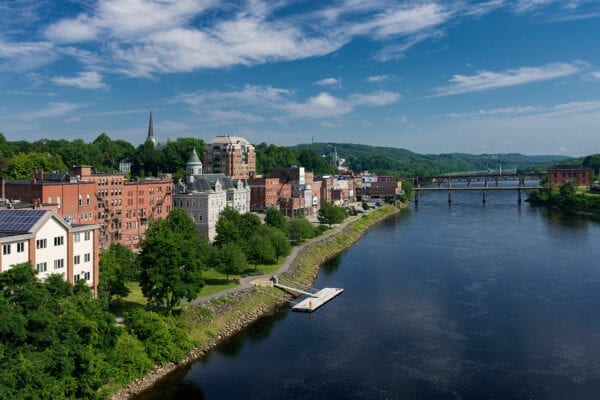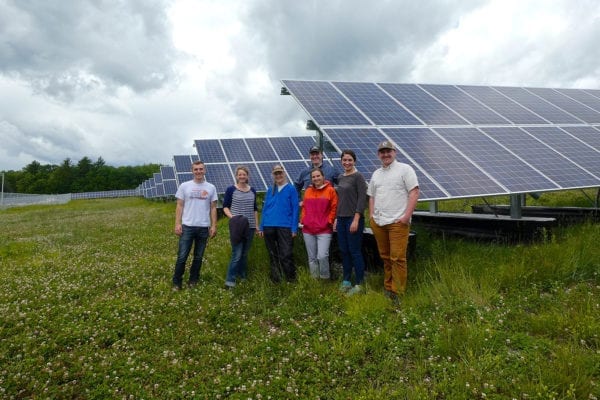Maine has taken big steps to address climate change and advance a clean energy economy, but the important role of local communities cannot be underestimated. Each of Maine’s nearly 500 towns and cities knows what is best for its own residents, and collaboration on the local level will be necessary to meet the ambitious climate goals laid out in Maine’s Climate Action Plan.
The Natural Resources Council of Maine developed this guide to help residents and officials in Maine’s towns, cities, and plantations access tools and resources to advance climate solutions that will help achieve a safe, prosperous, and healthy climate future for all.
How Do Municipalities Fit In?
To understand the role of municipalities in climate action, it is important to understand the relationship between federal, state, and local governance.

Downtown Augusta, Maine
The Federal Role
The money allocated by the federal government is generally the largest source of incoming funding to support climate projects at the state and local levels. Maine can advocate for funding for specific projects through our Congressional delegation, which will then be apportioned by state agencies and our state government.
The State Role
In addition to allocating federal funding, the State government identifies funding priorities through the State budget, establishes building codes, sets renewable energy standards, regulates the power sector, passes legislation, and facilitates the creation and implementation of statewide plans such as the Climate Action Plan.
The Municipal Role
Municipalities are responsible for the wellbeing of their residents, including parks and recreation services; emergency medical services; schools; police and fire departments; housing and land use policies; transportation services; and public works. Municipal governments make many of the decisions that impact the day-to-day lives of their residents the most but are increasingly doing so under serious budget constraints and pressures. From a climate action perspective, this means that cities and towns have important voices in where clean energy generation sites are located; how land within municipal boundaries is used and managed; where residents live and how they travel; and which public services will be prioritized. Given the urgency of responding to climate change, municipalities must be proactive in advocating for local climate solutions, accessing sources of funding from state and federal sources, and implementing effective climate and clean energy projects.
Opportunities for Municipal Climate Action
State Climate Action Plan Resources
With money coming in through the Federal government and new programs through Maine’s Climate Action Plan coming online regularly, the State has assembled two new resources to help Mainers navigate available climate and clean energy resources:
Community Resilience Partnership
Through grants and direct support to municipal and tribal governments made possible through the American Rescue Plan, the Community Resilience Partnership assists communities to reduce carbon emissions, transition to clean energy, and become more resilient to climate-change effects such as extreme weather, flooding, rising sea levels, public health impacts, and more.
The first round of grants was awarded in April 2022, providing $2.5 million to 75 communities around the state. The list of awarded projects and communities can be viewed here.
The second round of grants was awarded in December 2022, providing $2.9 million to 91 communities around the state. More information about those awards can be found here.
The Community Resilience Partnership was awarded an additional $5 million in the last State budget and will continue to open application windows for communities in the coming years. To be eligible, your community must be enrolled in the Community Resilience Partnership. Click here to learn more about these new grant opportunities.
The Inflation Reduction Act
The Inflation Reduction Act (IRA) was the largest investment in climate mitigation and clean energy ever made in this country. That money flowed down into local communities.
Clean Energy Solutions

Madison solar project
Community Solar Community solar is a great way to support clean energy in Maine without the upfront cost of solar panel installation. By purchasing a share of a solar farm, an individual, organization, school, or municipal building can receive clean energy from a larger solar project and reduce their energy bill by doing so. To learn more about community solar in Maine, read our guest blog by Sue Inches.
Power Purchase Agreement Another way to support clean energy in Maine is through a Power Purchase Agreement (PPA). These contracts allow schools, nonprofits, or municipalities to pair with investors who purchase and build a solar array at the host site and then provide power to the host, often at discounted rates. Read more about how a PPA could work for your community at ReVision Energy’s helpful site.
Municipal Solar Options We get a lot of questions about solar on the municipal level. Following the passage of legislation in 2019 that incentivized solar throughout the state, we created a resource compiling answers to commonly asked questions about municipal solar. You can take a look at that resource here.
Energy Efficiency
Weatherizing homes, schools, and municipal buildings is one of the most important steps Maine can take to reduce carbon emissions and lower energy bills for residents. Efficiency Maine has a residential weatherization rebate program available to support Mainers, particularly low-income residents. The Maine Jobs and Recovery Plan passed in 2021 allocates $25 million to low- and moderate-income weatherization projects and another $25 million to municipal, county, and school buildings. Learn more about this exciting program.
Heat Pumps: Efficiency Maine's heat pump rebate is one of its most successful programs. Learn more about how to get affordable, energy efficient heat pumps for your home or business.
Transportation Solutions
Area Comprehensive Transportation Systems
Maine has several regional transportation organizations that channel federal and state funding toward regional transportation initiatives that typically involve multiple municipalities. These regional Area Comprehensive Transportation Systems are typically supported by the Regional Planning Service Areas that support municipal cooperation within a given region. These transportation planning bodies regularly produce project reports and annual plans that are open for public comment and input.
- Androscoggin Transportation Resource Center (ATRC)
- Bangor Area Comprehensive Transportation System (BACTS)
- Kittery Area Comprehensive Transportation Study (KACTS)
- Portland Area Comprehensive Transportation Committee (PACTS)
Maine Clean School Bus Program
- The first round of Maine Clean School Bus funding awarded 34 buses across 13 school districts in the fall of 2022. The second round awarded 38 buses across 15 school districts. There will be another round of funding available for schools across the state in 2023. For more information and to access a survey for technical assistance to help plan your bus electrification projects and access funding, follow this link.
Electric Vehicle Charging
Maine’s electric vehicle (EV) charging network is rapidly expanding, thanks in part to Efficiency Maine’s series of competitive solicitations for public Level 2 charging stations and frequent competitive grants for workplaces, multi-unit dwellings, and public sites. Learn more about how you can advocate for public charging in your community.
Municipal Governance
While municipal governance structure varies town to town, local governments around the state implement important policies that impact land use, clean energy development, transportation, and more. Many towns and cities have Sustainability, Environment, or Energy committees that seek to advance local climate solutions. See the below resources from the League of Women Voters for an updated overview of local government in Maine.
- Guide to Local Government in Maine
- Spreadsheet of Maine municipalities and their forms of government
Other Resources
There are many inspiring organizations and initiatives that can lead you to local climate solutions. Take a look below at some of the opportunities available to get involved with ongoing work!
Maine Won't Wait Local Climate Action
- The Maine Climate Action Plan now has an interactive website featuring climate actions local groups and governments can take. Learn more at their page here.
Maine Municipal Association
- The Maine Municipal Association is the foremost organization supporting local governance in the state. Learn more about its advocacy and services at its website.
Portland and South Portland’s One Climate Future Plan
- The One Climate Future Plan developed by Portland and South Portland is a great example of a localized climate action plan developed and supported by municipal government and grassroots supporters.
A Climate to Thrive Local Leads the Way Program
- Initiated in 2021, Local Leads the Way hosts monthly virtual meetings to support communities throughout Maine in their efforts to find community-driven climate solutions.
Sierra Club Maine Climate and Community Action Teams
- Sierra Club has established a network of local chapters throughout the nation with a proven organizing model that centers local climate action. To find out how you can get involved, take a look at its website.
Banner photo: View of downtown Farmington, by S.Bierschwale/NRCM









